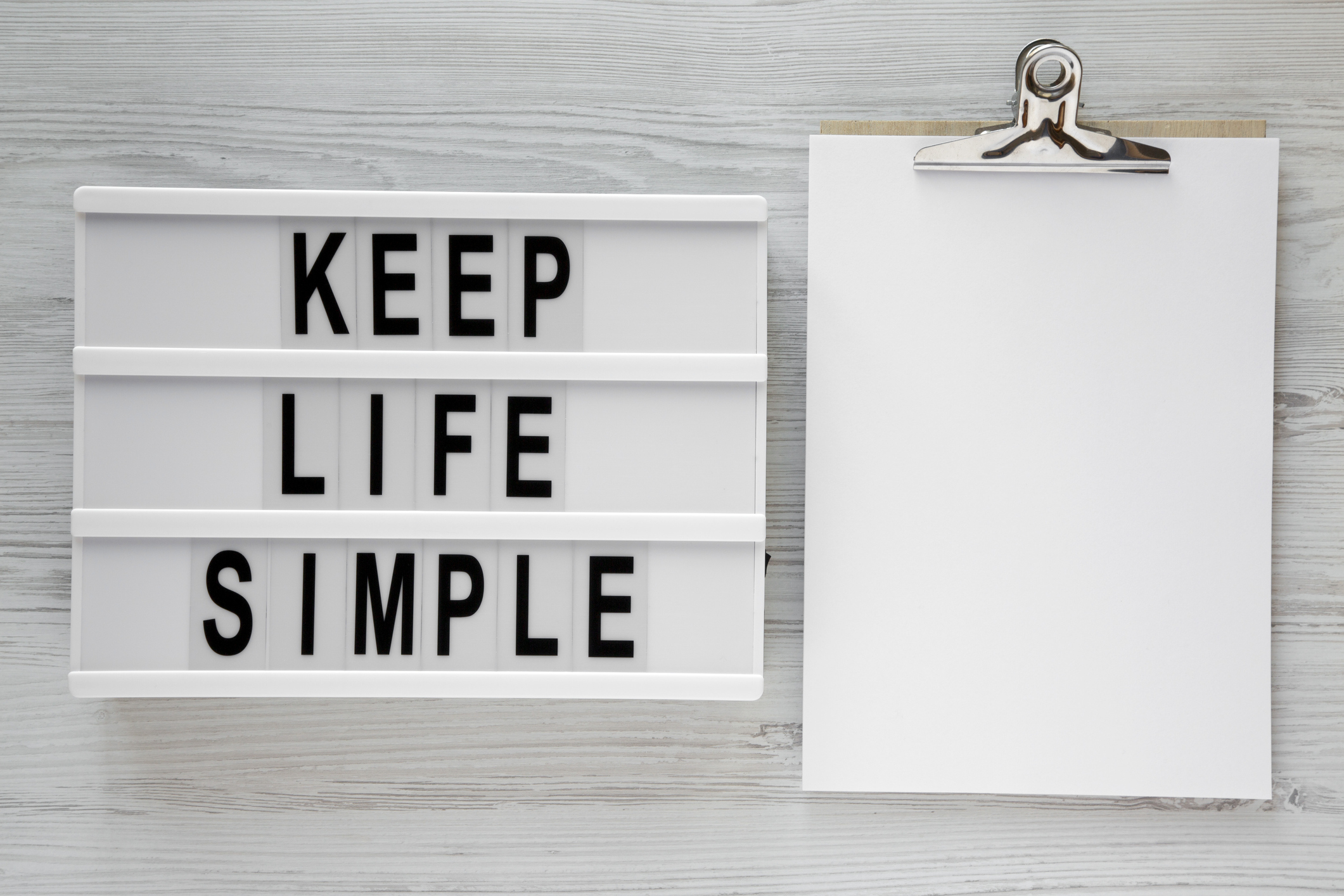
Have you ever noticed that, all of a sudden, the waist of your pants is too tight? What am I thinking? Of course you have! How about that parched feeling – the feeling that you could drink a gallon of water and still be thirsty? These are both indicators that we’ve waited too long to do the thing we know we should. In the first example, we should be sticking to a healthier way of eating to maintain our ideal weight. The second example highlights the crux of this post: by the time you realize it’s a problem, it’s too late. By the time you notice that you’re thirsty, you are already dehydrated. What can we do to notice the problem and change the story for ourselves?
Dr. Ari Tuckman was talking about sleep and being sleep deprived when he made that remark during the 2024 ICD Half-Day Virtual Conference Shining a Spotlight on ADHD.
I’ve been mulling over this concept for the past couple of weeks and thinking about some of the ways it applies to life and specifically to organizing. Plus, I’ve been thinking about strategies to change the story.
Planning
When we take the time to plan our day, week, or month we know what we want to happen. This is not to say that it will but if we have a plan in place, we have flexibility. When the unexpected happens, and you know it will, we know what we can juggle.
If we do not have a plan in place, we are constantly reacting to what life tosses our way. Without a plan we are like a boat without a rudder. We drift aimlessly through our day, getting to things when we get to them – or not.
By the time you realize you should have:
Planned to save money for a vacation
Made your car, plane, hotel reservations in advance
Planned to visit friends and family
Decided to get work done in advance
Been eating healthy meals
Planned to get to sleep early enough
(and you can add more, I’m sure)… it’s too late. The opportunity has passed. Can we do better? Of course we can.
Everyday offers a new opportunity to change the story.
Scheduling
Some people think that planning and scheduling create a tendency to be rigid. I continue to believe that planning and scheduling give the gift of flexibility. As I already said, when you know what the plan is, you know what you can juggle.
If you schedule chores during the week, you can be confident that by the end of the week all your chores will be done. Because you know what chores you have scheduled on which day you can opt not to do your chores on a specific day and double up on the next day.
Let’s say you have a huge project you want to do and that it’s too much to tackle at once. When you schedule the steps of the project, you have better control over when the project will be completed. Plus, you reduce your stress because you’re not overwhelmed just thinking about getting this project done.
If you do not plan to get chores done or schedule the steps of a project by the time you realize you should have done so, it’s too late.
Clutter
What about clutter? My friend, business partner, and fellow professional organizer, Jonda Beattie just posted a blog about clutter blindness. Clutter doesn’t come into our homes as clutter. It arrives innocently.
It may be a gift we didn’t want that sits around on a table, on a shelf, or in a closet taking up valuable real estate because we don’t know what to do with it.
Maybe it’s something we bought that we thought we wanted and would use but we don’t.
Clutter may be an accumulation of mail that we haven’t dealt with.
Maybe it’s clothes that are too big, too small, out of style or that we just don’t like anymore.
By the time we notice clutter, it’s too late. We already have a problem.
The problem isn’t the clutter, it’s us. We must take off our blinders, realize clutter has taken up residence in our home, and do something about it.
Change your behavior to change the story
The solution, as Dr. Tuckman said in his presentation, is to do something about the problem.
If getting enough sleep is the problem, figure out what part of your schedule you need to change so you can be in bed and ready to sleep to get the correct number of hours of shut-eye.
Plan healthy meals
If the problem is that the waist of your pants is too tight, start planning healthy meals. The weight that slowly appeared over weeks or months of not eating properly is not going to disappear overnight, but it will leave as it came, slowly. Who knows, you may like healthy meals better.
Drink more water
Maybe you will also start carrying a water bottle around and pay closer attention to the amount of water you drink during the day. Consider setting alarms to remind you to drink a glass of water. Small changes will bring you big results – over time.
Schedule chores
If you forget to plan or schedule household chores, consider creating a weekly routine to get the chores done during the week. You will get your weekend back and not feel like you’re punishing yourself by spending the weekend cleaning.
Use a weekly and monthly planner to schedule appointments, plan trips, and projects. Check the planner daily. Let it become your best friend. If you use it consistently, it will show you when you have available time so you can be flexible when life throws you a curve ball.
Clear the clutter
Is dealing with clutter a problem? Pay attention to the things in your home. Notice what you use and what is collecting dust.
My best advice is to do this one room or area at a time. Make decisions about the things in that space. Schedule time to take things that don’t belong to a different room or to a donation site.
I love this concept because it asks us to notice the ways in which things are happening in our lives because if we don’t, it’s too late. We will suffer the consequences. The good news is that once we notice what we don’t want to happen, we can change our behavior and change the story.
FAQs
How long does it take to change a behavior?
Lasting change happens slowly. Always start with the smallest aspect. Once you have that down, add another layer of change until you are satisfied with the amount of change you have created.
Do you have to practice the new behavior every day?
The more consistent you can be, the faster you will create change.
Is there support for changing behavior?
Yes. There are support groups (in-person and virtual) for practically everything. I run a virtual empowerment group with Jonda Beattie called Clear Space for You. We offer gentle accountability and provide organizing strategies to our participants.
Reach out to me to schedule a free 30-minute phone consultation for more information about help creating organizational strategies. Email me at: dnqsolutions@gmail.com
Diane N. Quintana is an ICD® Master Trainer, a Certified Professional Organizer® in Chronic Disorganization, a Certified Professional Organizer and owner of DNQ Solutions, LLC and co-owner of Release●Repurpose●Reorganize, LLC based in Atlanta, Georgia. She specializes in residential and home-office organizing and in working with people affected by ADHD, Hoarding, and chronic disorganization.


Plan in advance if you can for sure, everything been is out in advance through social media or any form of fast advertisement that will push up to plan early. Otherwise it’s causing prices to go up and then you can’t find what you want for the price you can afford.
Another good one I like, “the problem isn’t the clutter, it’s us” I so agree on this statement. It’s us, clutter accumulate, it’s left and forgotten, things we don’t want and we don’t even like.
Thank you, Janet!
I schedule and plan all the time but was having a hard time getting that water in. I use a Mindfulness Bell App that rings 7 times a day at random times. When I hear that chime, I stop as soon as possible with what I am working on and drink some water. I also stretch and look out the window. I needed that auditory reminder to get that water in.
I totally understand! Thank you for commenting.
There’s so much truth packed into this post. Some people avoid making plans because they think it will prevent serendipity or flexibility, but as you wisely note, planning and being prepared allows for more flexibility. (This is not to say I’m particularly flexible; once I have a plan in place, it sets my teeth on edge to have to change it because I tend to ruminate on my plans like mantras; any anxiety about doing something is soothed by thinking about the steps of the plan; tweaking the plan means starting anew!) I’m always surprised that people can do so much off-the-cuff without stress. If I didn’t plan, I’d be anxious about being late or missing deadlines, or if they’re not time-based tasks, I’d probably never get anything accomplished!
I love the water example. During the summer, it’s easy to remember to drink, but I tend not to get thirsty in the colder months, and without planning and reminders, I might not drink a drop from lunchtime until dinner, but when I walk in the house in the evening, I’ll be suddenly struck that I’m as parched as a desert! So, in the winter, I’ve learned to use an app to remind me (by virtue of a water cooler “glug” alert) to take some sips.
Thank you, Julie. I’m a planner, too. I love knowing in advance the steps to follow. This is not to say that I don’t stray from my plan, because I do. But it is easier for me to do that when I know what I’m omitting.
I love how you expanded on Ari Tuckman’s idea about sleep at the ICD Virtual Conference. Identifying the problem before it’s too late is ideal. But as we know, often that’s not the case. Noticing the challenges and their adverse effects on your life is often the impetus and motivation for change. However, once the problem is identified, it’s possible to change the story. I love your suggestions for how to do this- changing one habit at a time, reaching out for support, planning, and more.
This is a hope-filled message.
Thank you so much for your comments, Linda!
I remember when I was early married when we learned the hard way that we need to plan vacations far in advance. Here in the northeast, there are a lot of people, and hence many people wanting vacation rentals at the same time. Getting on top of this task about a year in advance ended up being what worked best for us. It felt “rigid,” but as you say, it actually then gave us freedom to choose exactly what we wanted. It also saved us time, because we weren’t “scrambling” near vacation time, which took way more time than booking a year in advance.
Yes. Sometimes valuable lessons are learned the hard way. Thank you for commenting, Seana!